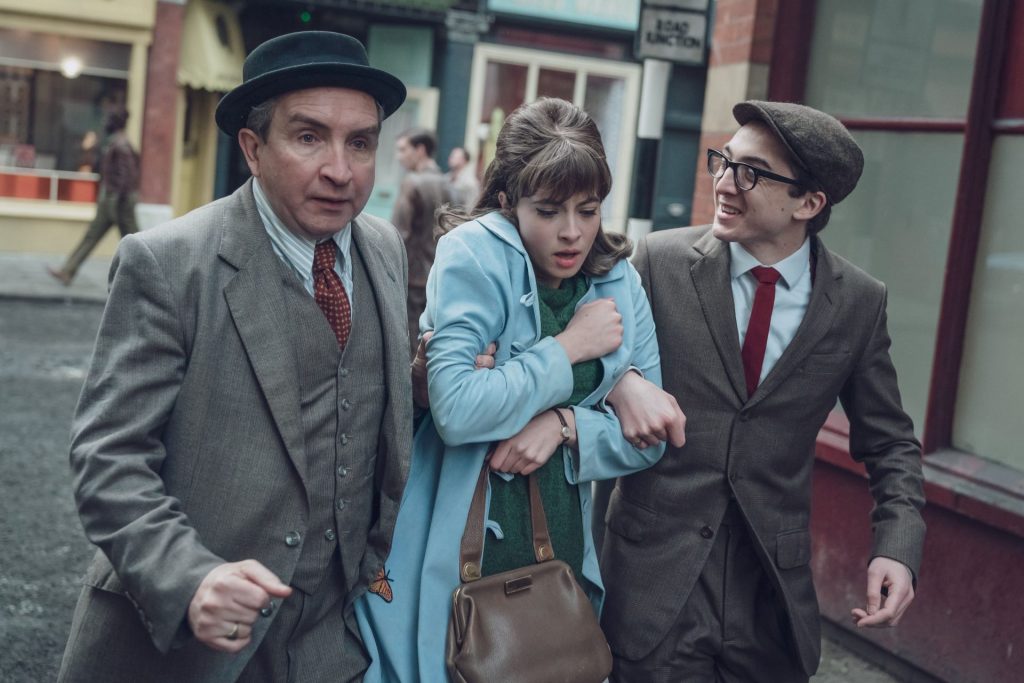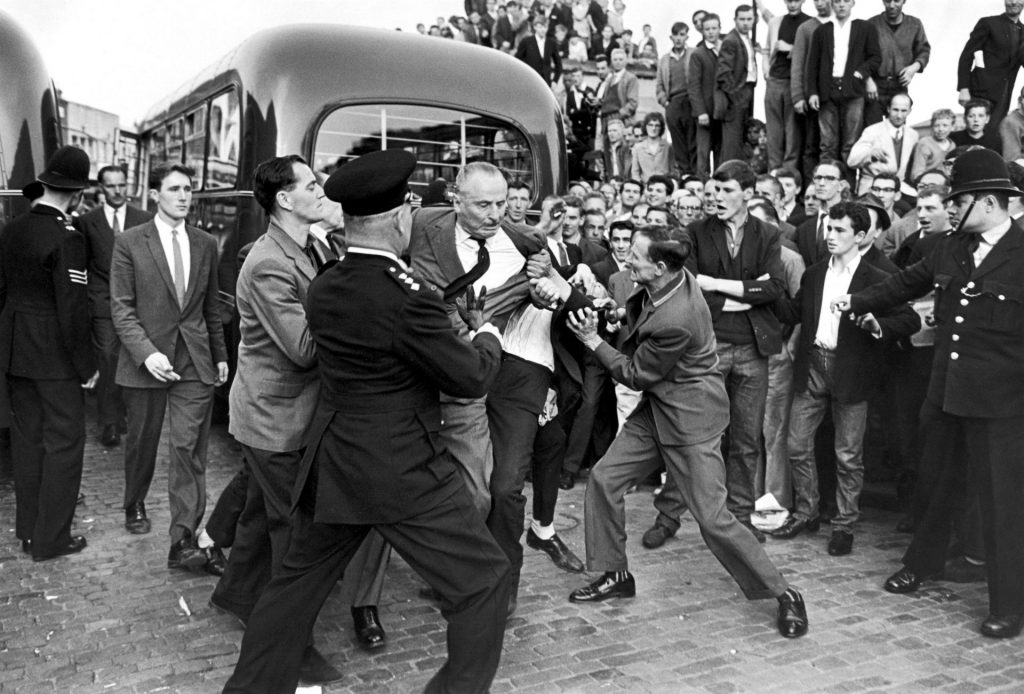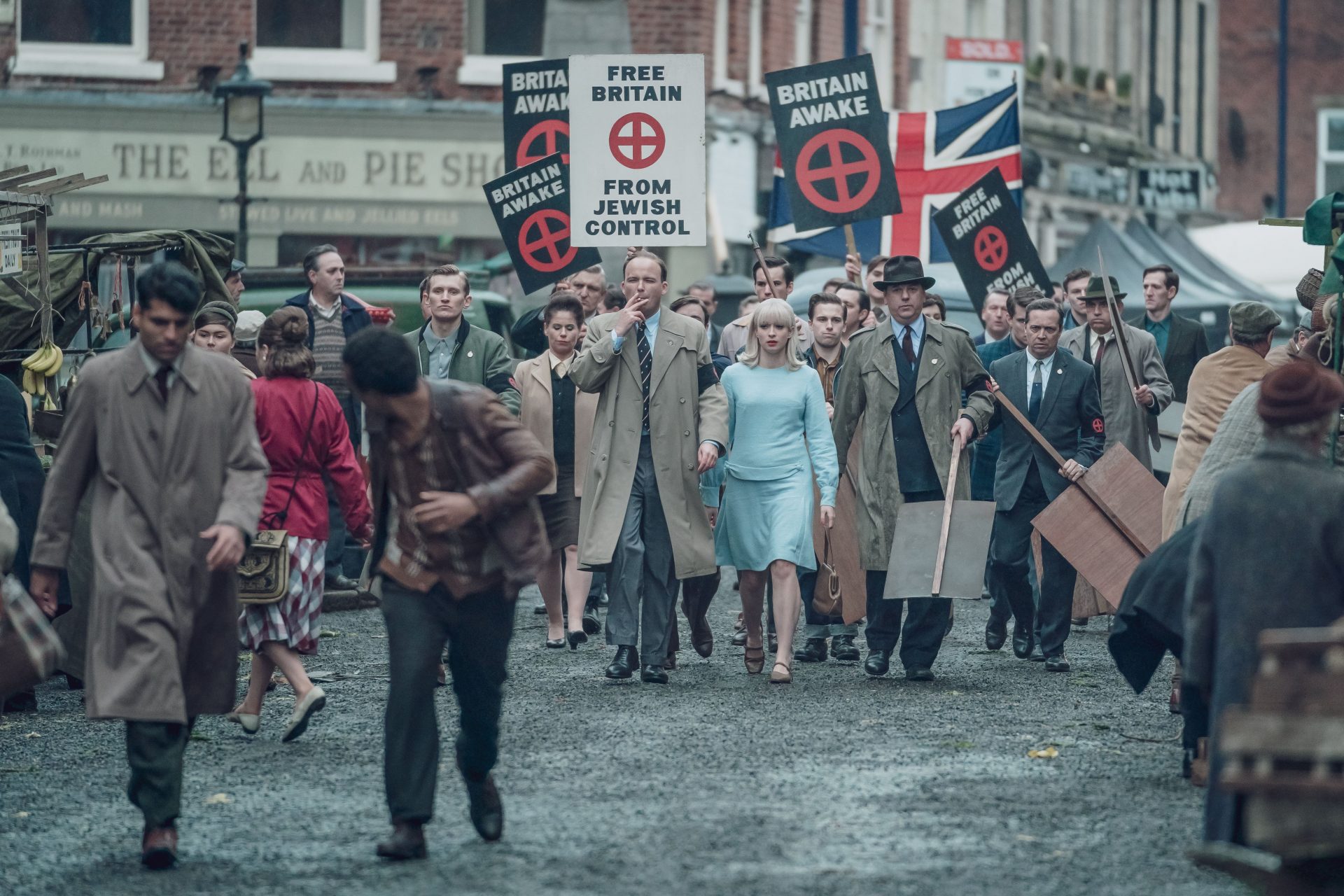Fading into sharp and colourful focus, the image of the swastika on a flag is always shocking. But when you realise that flag is here, in Trafalgar Square, and it’s 1962, so soon after the end of the war, the shock turns to disbelief.
That image – and that feeling – comes when watching the new BBC drama Ridley Road, set around the rise of a new fascist movement led by Colin Jordan. All the more stomach-churning is that the footage of the swastika and the crowd giving Nazi salutes is not dramatic reconstruction but actual archive, colour news footage. This really happened.
“There’s so much nostalgia around London in the 60s,” says Ridley Road writer and creator Sarah Solemani. “We think of Swinging London, a hippy and free vibe of youthful expression and love, but the truth is there were swastikas just marching distance from Carnaby Street.”
Her script is based on the 2015 book Ridley Road by Jo Bloom and is now a four-part drama weaving in a fictional story of Vivien Epstein, a Jewish girl from Manchester who comes to London in search of her secret lover and becomes embroiled in an underground world of Jewish resistance fighters and fascist thugs.
Vivien, played by impressive newcomer Agnes O’Casey, takes lodgings in the bustling East End market of the title, and gets a job in a Soho hair salon (run by Tamzin Outhwaite with a fag in her mouth). She’s on the run from her parents and an unsuitable marriage to a nice but very dull Jewish boy, but she’s looking for her true love Jack who has suddenly left her and disappeared.
Seeking out her uncle Solly in Ridley Road leads her into a clandestine group of Jewish activists, something she understands more after she’s caught up in the fascist rally in Trafalgar Square, which turned into a riot, police turning on the anti-facist demonstrators who were protesting against the swastikas and banners proclaiming: “Free Britain from Zionist Control”.
“People did not know this story,” says Solemani, who is best-known as an actress, starring as Bridget Jones’ best friend, in Mrs Henderson Presents and in the Jack Whitehall school comedy Bad Education. “So few people knew it, and that’s partly the inspiration for wanting to tell it. My father grew up in that area, my grandmother did her grocery shopping at Ridley Road market but I had no idea how organised the far right were in 1962, or how they were openly allowed to march through London, with a permit. I didn’t know how much of a very real threat they were.”
Solemani’s story tells of how a group of working Jewish men and women, a mix of left and right, came together to form the 62 Group to fight the fascists off the streets and push them back to the fringes of British politics. The 62 Group were a – very real – body formed from the remnants of those who fought off Oswald Mosley’s blackshirts in Cable Street in the 1930s and recruiting members and muscle from the dock workers and the clubs and bouncers of Soho.

In the TV drama, the lead figure is played by Eddie Marsan as an East End black cab driver named Solly Malinowsky, ably assisted by his wife Nancy. She’s played with matriarchal East End strength by Tracy-Ann Oberman, herself a former EastEnders star and now a vocal Jewish activist as well as one of UK stage and television’s most respected and busy actresses, with roles in Friday Night Dinner, Toast, It’s a Sin and currently appearing in The Windsors in the West End.
“I did know the story quite well because my grandparents were friends with several people in the 62 Group, but they didn’t talk about it much. But it’s still a shocker to see the real footage of Nazis on our streets in 1962,” says Oberman. “Everyone in 60s Britain knew about the Holocaust – in which case, how could fascism have risen again so quickly and why is this story glossed over and forgotten about, like it never happened? At a time when we’re remembering our colonial past and the slave trade and bits of history we try to erase, we mustn’t ignore this eternal British flirtation with fascism.”

For many viewers, the drama will be a an historical eye-opener as well as a thriller and a loving recreation of the period. But it’s hardly an exercise in nostalgia. According to Solemani, it’s more about the dangers of nostalgia which creates a false picture of history, particularly in film and television but which can have harmful consequences in the national psyche.
“That nostalgia is false, but it’s a nostalgia the far right like to peddle,” she says. “And it is misleading and problematic, this idea of a long-lost, precious country that we need to get back.”
The drama, directed by Lisa Mulcahy, is very good on the social upheaval of the time. Vivien takes lodgings run by a traditional East End landlady played by Rita Tushingham, the iconic 60s actress from Taste of Honey. Her terrace is under threat of demolition, the council preferring to move tenants into the new high-rise blocks being constructed around Bethnal Green. It’s a world you can spot in films of the time, such as Sparrows Can’t Sing, which starred Barbara Windsor.
Says Solemani; “Housing is about people feeling dislocated, being shifted and that’s confusing and overwhelming for communities and individuals who then become vulnerable to reductive ideologies, making it easy for people to point the finger at ‘the other’. It all starts as as social problem.”
British television has had a surge of dramas telling such stories. Steve McQueen’s recent TV epic Small Axe series told hitherto unspoken stories of the black experience to new generations through expert drama. Gurinder Chadha’s film Blinded by the Light detailed the little aggressions and insults felt by Luton’s Pakistani community, which eventually resulted in full blown riots.
Says Oberman; “The Anglo-Jewish community didn’t like to draw attention to anti-Semitism, wanting their children to have a better life in which they didn’t have to worry about racists burning down their synagogues. But if the authorities don’t react, then you have to take matters into your own hands and respond with bricks and bats.”
Solemani agrees: “We are at a moment in our culture where we are talking about how trauma is passed down, and we heard about it in Black Lives Matter and in the stories of black racism.
“I felt the need, as I told this story, that British Jews now need to define their own experiences of racism here the same way other minority groups have, in a way to show how all forms of racism bleed together and how fascism can only be defeated if the targets of it stand together.”
Amid all the messaging, it mustn’t be forgotten that Ridley Road is a cracking bit of British television, a thriller and a romance and a political piece that’s sexy and funny in places as well as nail-bitingly tense.
The cast are excellent throughout and the period details immaculate, with striking use of archive footage blending into the modern filming, conveying a sense of history that is still very real and relevant to today.
Ridley Road is on BBC One on Sunday nights until October 24 and on iPlayer
Warning: Illegal string offset 'link_id' in /mnt/storage/stage/www/wp-includes/bookmark.php on line 357
Notice: Trying to get property 'link_id' of non-object in /mnt/storage/stage/www/wp-includes/bookmark.php on line 37








